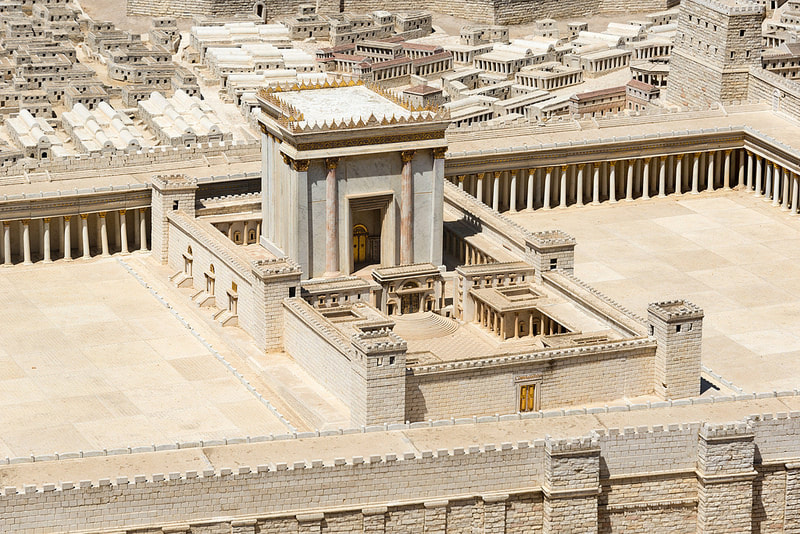|
It can happen in an instance and before we know it, we have opened the door for the demonic to influence our lives. 1 Peter 5:8 warns us: "Be self-controlled and alert. Your enemy the devil prowls around like a roaring lion looking for someone to devour." The devil looks for us to agree with the kingdom of darkness. When we do, he sets up camp within our souls.
Six days before Passover Jesus came to a dinner prepared to honor Him at the home of Lazarus and his sisters. "Then Mary took about a pint of pure nard, an expensive perfume; she poured it on Jesus' feet and wiped His feet with her hair...But one of His disciples, Judas Iscariot, who was later to betray Him, objected." (John 12:3-4) With great indignation, Judas pointed out that the perfume was worth a year's wages and should have been sold so that the money could be used to help the poor. Verse 6 reveals his motive. "Not that he cared for the poor--he was a thief, and since he was in charge of the disciples' money, he often stole some for himself." (NLT) Jesus came to Mary's defense in front of everyone and explained that her extravagant display was one of love for Him and preparation for His burial. He said, "You will always have the poor among you, but you will not always have me." (Verse 8) Can you feel the spirit of offense rising within Judas? Jesus disagreed with him and told him to leave Mary alone. I am sure that Judas was already on the devil's radar screen since he was regularly stealing from the disciples' moneybag. Now he took an offense against Jesus and opened the door for the devil to deceive him and lead him to betray Jesus. (John 13:2) In his book, Paid in Full, Rick Renner describes what happened to Judas. "...The devil quickly seized an opportunity to inject a seed of betrayal into Judas' heart...Rather than let go of the disagreement and forget about it, Judas let the issue become a big deal in his mind. Because Judas didn't take his thoughts captive, the devil succeeded in tainting his view of Jesus." Francis Frangipane recently wrote a piece called "Unoffendable." He reminds us that Jesus warned about the result of allowing an offense to remain in our hearts: betrayal, hatred and cold love. Francis says, "If we will 'endure to the end,' we will have to confront the things that bother us. When Jesus warns that we need endurance, He is saying that it is easier to begin the race than finish it...Do not minimize the danger of harboring an offense!" "You must make that offense become an opportunity to become more Christlike." Proverbs warns, "An offended brother is more unyielding than a fortified city..." We must guard against having an offended heart. One of the primary ways in which we take on an offense is through having unrealistic expectations about someone. We set ourselves up for disappointment and offense when others fall short. We must learn to be grateful for who God made them to be rather than be offended for what they fail to do. The devil is always looking for those times when we are offended so that he can draw us down the path of darkness and separate us from those we are meant to love. Jesus demonstrated a heart of love toward all who wounded Him as He walked toward the Cross. Let us follow His example. Here is what evangelist Todd White says about being offended: "I never carry an offense, because I am carrying the Cross."
After His baptism and temptation in the wilderness, Jesus selected 12 disciples to walk with Him. Together they attended the wedding in Cana where Jesus miraculously turned water into wine and revealed His glory. Then, He began His ministry in Jerusalem by attending the annual Passover there. He found the Temple area filled with money changers and animals meant for sacrifice. As He drove them from the Temple, He declared, "Get these things out of here. How dare you turn my Father's house into a market!" (John 2:16) This very act of passion was the fulfillment of Psalm 69:8-9. "I am a stranger to my brothers, an alien to my own mother's sons; for zeal for your house consumes me, and the insults of those who insult you fall on me." Jesus' ministry would be culminated in Jerusalem during the Passover, just as it began. When He entered the Temple, He found it to be the same way it was three years before. "Then He entered the Temple area and began driving out those who were selling, 'It is written,' He said to them, 'My house will be a house of prayer; but you have made it a den of robbers.'" (Luke 19:45) Both the beginning and the end of the ministry of Jesus took place in the Temple at Passover, and it was highlighted by His concern for the Temple. These similarities stand as bookends of His life and demonstrate how we should live our lives by treating our bodies (the temple of God) with respect. "Don't you know that you yourselves are God's temple and that God's Spirit lives in you? If anyone destroys God's temple, God will destroy him, for God's temple is sacred, and you are that temple." (1 Corinthians 3:16-17) This is a sobering truth--so important that Jesus began and ended His ministry cleansing the Temple. Annually, since the days of Queen Esther, the Jews have celebrated a feast called Purim. There are some interesting details in this story that should be considered. The enemy of the Jews in Esther's day, Haman, was a direct descendant of the king of the Amalekites, King Agag. (Esther 3:1) The Lord had instructed King Saul of the tribe of Benjamin to go to battle against the Amalekites. He said, "Now go, attack the Amalekites and totally destroy everything that belongs to them. Do not spare them; put to death men and women, children and infants, cattle and sheep, camel and donkey." (1 Samuel 15:3) Saul disobeyed God's instructions, allowed King Agag to live, and took as plunder "everything good." His disobedience set into motion a continuing battle for the Jews against an anti-Semitic spirit that still lives today.
We can see the impact of Saul's sin on the Jews who lived in the territory of the Persian king, Xerxes. During his reign a search was made for beautiful young virgins that could be brought to the citadel of Susa where they would receive beauty treatments. It was the king's desire to select a queen from among these virgins. Esther, an orphaned Jewish girl, had been brought into exile from Jerusalem along with her cousin Mordecai, from the tribe of Benjamin. She was the favorite from the king’s harem and was eventually appointed queen. Mordecai kept watch at the king's gate the entire time that Esther was in the palace. There was a certain noble in the king's court named Haman. He was a descendant of King Agag of the Amalekites who hated Mordecai and schemed to kill him and all his people. He chose a day to implement his decree to kill all the Jews through casting a lot (Pur). Esther was in a position to petition the king for the life of her people. Mordecai pointed out that she may have come to her royal position "for such a time as this." (Esther 4:14) Even though death could come to anyone who approached the king without being called, Esther willingly went before him. He extended his golden scepter to her so that she was able to garner his support in reversing Haman's evil decree. Mordecai was given the king's signet ring to seal a new decree. The king's edict "granted the Jews in every city the right to assemble and protect themselves; to destroy, kill and annihilate any armed force of any nationality or province that might attack them and their women and children; and to plunder the property of their enemies." (Esther 8:11) On the 13th and 14th day of Adar the edict was carried out. Ester 9:10 and 15 both tell us an interesting fact about the plunder: "But they did not lay their hands on the plunder." I have been pondering this statement about plunder. One of the purposes of plunder is for honoring and obeying God. Is it possible that they thought it would not have been honoring to God to take the plunder in this instance? It may be. And, perhaps God was giving them an opportunity to right a wrong. I do not think it is a coincidence that both Saul and Mordecai were from the tribe of Benjamin. In any event, the Jews began the celebration of Purim to remember God's faithfulness in protecting them from their enemies and to remember how their sorrow was turned to joy. They will begin the celebration of Purim on Wednesday evening and will retell the story of Esther. Retelling this story is a reminder of God's faithfulness and His grace in giving us opportunities to right any wrongs. Let us also celebrate God's faithfulness to us.  Joy comes as a result of a right relationship with God. According to the Holman Bible Dictionary joy is a state of delight and well-being that results from knowing and serving God. The Bible calls it a fruit of the Spirit. Since it is a fruit of the Spirit, we know that joy is a quality of God. God rejoiced over His creation. (Psalm 104:31) He also talks about His intent for His people to have joy in Isaiah 65:18-19. "But be glad and rejoice forever in what I will create, for I will create Jerusalem to be a delight and its people a joy. I will rejoice over Jerusalem and take delight in my people..." In the parable of The Lost Son we see that one of God's greatest joys comes from the repentance of one sinner. (Luke 15:11-32) And, can we imagine the great joy that Father God felt when Jesus was born on earth? The angels expressed this joy to the shepherds: "Do not be afraid. I bring you good news that will cause great joy for all the people." (Luke 2:10) Joy itself was manifest on earth in Jesus.
When we have the fruit of joy another important characteristic of God will manifest--strength! There are unique times on the Jewish calendar when it is easier to gain these qualities. We are in that time frame right now--the month of Adar II. Adar means strength, and we are in a leap year where there are two Adars--I and II--a double portion. Every three years an additional Adar month is added to the calendar so that the lunar months stay in sync with the solar calendar. God wants us to end the year with strength so that we can leap into the New Year fully refreshed and ready to receive His blessings. And how do we obtain strength? "...The joy of the Lord is your strength." (Nehemiah 8:10) Adar is meant to be a time when we celebrate God's provision that builds up both our strength and joy. The enemy of our souls would like to steal our joy so that we cannot overcome him and enthusiastically enter the New Year ready to receive the new things that God is doing in our lives. We must develop our war strategies, putting on a "...garment of praise instead of a spirit of despair..." (Isaiah 61:3) Queen Esther modeled this for us when she overcame evil Haman's plan to annihilate all the Jews by implementing a strategy that won the king's heart so that he reversed a decree to kill her people. Every year since then the Jews celebrate this victory on the 14th and 15th of Adar. It is known as the "time when the Jews got relief from their enemies, and as the month when their sorrow was turned into joy and their mourning into a day of celebration..." (Esther 9:22) These days of celebration are called Purim which is the plural of "lot" because this is how the day was chosen to attack the Jews. Think about how you feel when you are overflowing with joy! Don't you feel like you could take on the entire world? Worry is out of your mind, confidence directs your steps and strength wells up. 1 Chronicles 16:27 confirms where we find strength and joy: "Splendor and majesty are before Him; strength and joy in His dwelling place." King David understood where His strength and joy came from. "Praise be to the Lord for He has heard my cry for mercy. The Lord is my strength and my shield; my heart trusts in Him, and I am helped. My heart leaps for joy, and I will give thanks to Him in song. The Lord is the strength of His people..." (Psalm 28:6-8) Asaph, a writer of several of the Psalms realized the power in expressing joy. "Sing for joy to God our strength; shout aloud to the God of Jacob!" (Psalm 81:1) Do you see the interesting dynamic between joy and strength? They build upon one another. Joy generates strength and strength generates more joy. Jesus shows us how joy brings strength, and is written about in Hebrews 12:2. "Let us fix our eyes on Jesus, the author and perfecter of our faith; who for the joy set before Him endured the Cross, scorning its shame, and sat down at the right hand of the throne of God." I think the joy set before Jesus was His knowledge that His sacrifice would bring many to salvation and that He would please His father. It was the joy He had that gave Him the strength to endure the pain and agony of the Cross. Once His sacrifice was accomplished His joy became even greater. So, let’s keep our eyes on Jesus, strengthen our relationship with Him and watch as both joy and strength increase. "When religion has said its last word, there is little that we need other than God Himself. The evil habit of seeking God-and effectively prevents us from finding God in full revelation. In the and lies our great woe. If we omit the and we shall soon find God, and in Him we shall find that which we have all our lives been secretly longing." So writes A. W. Tozer in his book, The Pursuit of God.
God wired us to worship Him. It is part of our DNA. This unique characteristic that God placed inside of every person must be satisfied. The desire to worship is so strong that we will do anything to fulfill it. We will build an altar and bow at it, if not to God, to someone or something else. Ecclesiastes 3:11 tells us this: "...He has set eternity in the hearts of men..." God is an Eternal God. Worship is a condition of the heart. Our hearts are on a quest to be satisfied through worship. The truth is that worship that is not God-centered will never satisfy. However, worship that is God-centered is sacrificial and requires that we yield ourselves to Him. Here is how Romans 12:1 says it: "...In view of God's mercy, offer your bodies as living sacrifices, holy and pleasing to God—This is your spiritual act of worship." Worship is a choice. We get to choose the altar where we will bow. The psalmist knows how to express the details of worship. "Great is the Lord and most worthy of praise; He is to be feared above all gods. For all the gods of the nations are idols, but the Lord made the heavens. Splendor and majesty are before Him; strength and glory are in His sanctuary. Ascribe (Offer a concrete expression of praise.) to the Lord, O families of nations, ascribe to the Lord glory and strength. Ascribe to the Lord the glory due His name; bring an offering and come into His courts. Worship the Lord in the splendor of His holiness; tremble before Him, all the earth." (Psalm 96:4-9) Here is the good news: The Lord draws closer and closer to us in response to our worship. (James 4:8) Worship is total surrender to God's will. God's desire is for us to be immersed and saturated in His Presence. He wants us lost in worship. Lost means that we are hidden in Christ, ruin for anything else and cannot find our way back to life as it used to be. As we abide in Him and express our love and awe for Him, we will begin to carry the evidence that we have been with God. I want to leave you with the words of a worship song written by Israel Houghton--"I Live to Worship You." "Away, Away from the noise, alone with You. Away, Away to hear Your voice, and meet with You. Nothing else matters. My one desire is... Chorus: To worship You, I live. To worship You, I live; I live to worship You. To worship You, I live. To worship You, I live; I live to worship You. Oh, Oh, Oh, Ohhhhh. Oh, Oh, Oh, Ohhhhh. Oh, Oh, Oh, Ohhhhh. Oh, Oh, Oh, Ohhhhh. Away, Away from the noise, alone with You. Away, Away to hear Your voice; It's been a while, But hear my heart cry again." Chorus. These are words that demonstrate a true heart of worship! |
Joan E. MathiasCategories
All
Archives
July 2024
|




 RSS Feed
RSS Feed